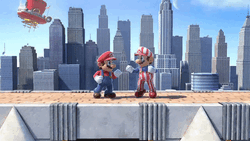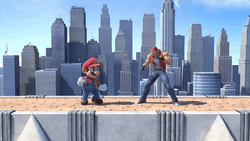Reverse: Difference between revisions
Gligar2007 (talk | contribs) mNo edit summary |
No edit summary |
||
| (One intermediate revision by one other user not shown) | |||
| Line 3: | Line 3: | ||
[[File:Mario Side B SSBU 2.gif|thumb|250px|{{SSBU|Mario}}’s [[Cape]] is an example of a move with the reverse effect.]] | [[File:Mario Side B SSBU 2.gif|thumb|250px|{{SSBU|Mario}}’s [[Cape]] is an example of a move with the reverse effect.]] | ||
[[File:Mario Side B SSBU 3.gif|thumb|250px|{{SSBU|Mario}}’s [[Cape]] being used on {{SSBU|Terry}}.]] | [[File:Mario Side B SSBU 3.gif|thumb|250px|{{SSBU|Mario}}’s [[Cape]] being used on {{SSBU|Terry}}.]] | ||
'''Reverse''' is an attack [[effect]] in the ''{{b|Super Smash Bros.|series}}'' series that debuted in ''[[Super Smash Bros. Melee]]'' and has appeared in every subsequent game. A fighter hit by a reverse attack is forcibly turned around to face the opposite direction instead of [[flinch]]ing. | '''Reverse''' is an attack [[effect]] in the ''{{b|Super Smash Bros.|series}}'' series that debuted in ''[[Super Smash Bros. Melee]]'' and has appeared in every subsequent game. A fighter hit by a reverse attack is forcibly turned around to face the opposite direction instead of [[flinch]]ing, putting them at a positional disadvantage due to facing the opposite direction and having to wait until their current action (if any) can be interrupted, and possibly [[KO]]ing them if this means an attack with a lot of movement (such as a [[recovery]] move) propels them offstage. | ||
In ''Melee'', reverse hitboxes apply a fixed amount of [[knockback]], equal to a launch speed of 2.0 on aerial victims and 2.25 (with the vertical part negated) on grounded ones. In later games they generally do not cause knockback, though some do, and there are situations where they can also boost the momentum of an airborne character. Reverse attacks typically also [[reflect]] [[projectile]]s, but this is solely a design convention and not a property of the reverse effect. | |||
[[Stance mirroring]] was introduced in ''[[Super Smash Bros. 4]]''. The reverse effect does not always respect mirroring, causing the character to spin and end up in a non-mirrored stance. This is quickly if not immediately corrected by the character's current or next action, so its effects are minimal, but the visual effect is jarring. | |||
In ''[[Super Smash Bros. Ultimate]]'', {{SSBU|Ryu}}, {{SSBU|Ken}}, {{SSBU|Terry}}, and {{SSBU|Kazuya}} always face their opponent when one is left standing (including teammates if [[Team Attack|Friendly Fire]] is on), but if one of them is hit by an attack with the reverse effect, they immediately turn back to face the opponent again. {{SSBU|Min Min}} cannot be reversed while in any part of her ARM attacks besides neutral aerial, including the charge frames of forward smash. | In ''[[Super Smash Bros. Ultimate]]'', {{SSBU|Ryu}}, {{SSBU|Ken}}, {{SSBU|Terry}}, and {{SSBU|Kazuya}} always face their opponent when one is left standing (including teammates if [[Team Attack|Friendly Fire]] is on), but if one of them is hit by an attack with the reverse effect, they immediately turn back to face the opponent again. {{SSBU|Min Min}} cannot be reversed while in any part of her ARM attacks besides neutral aerial, including the charge frames of forward smash. | ||
| Line 39: | Line 39: | ||
|- | |- | ||
|[[Mii Swordfighter]] | |[[Mii Swordfighter]] | ||
|[[Reversal Slash]] | |[[Reversal Slash]] | ||
|{{GameIcon|SSB4}}{{GameIcon|SSBU}} | |{{GameIcon|SSB4}}{{GameIcon|SSBU}} | ||
|- | |- | ||
Latest revision as of 10:23, May 30, 2024
- This article is about the effect. For the technique in Melee, see pivoting. For the technique in all five games, see B-sticking.
Reverse is an attack effect in the Super Smash Bros. series that debuted in Super Smash Bros. Melee and has appeared in every subsequent game. A fighter hit by a reverse attack is forcibly turned around to face the opposite direction instead of flinching, putting them at a positional disadvantage due to facing the opposite direction and having to wait until their current action (if any) can be interrupted, and possibly KOing them if this means an attack with a lot of movement (such as a recovery move) propels them offstage.
In Melee, reverse hitboxes apply a fixed amount of knockback, equal to a launch speed of 2.0 on aerial victims and 2.25 (with the vertical part negated) on grounded ones. In later games they generally do not cause knockback, though some do, and there are situations where they can also boost the momentum of an airborne character. Reverse attacks typically also reflect projectiles, but this is solely a design convention and not a property of the reverse effect.
Stance mirroring was introduced in Super Smash Bros. 4. The reverse effect does not always respect mirroring, causing the character to spin and end up in a non-mirrored stance. This is quickly if not immediately corrected by the character's current or next action, so its effects are minimal, but the visual effect is jarring.
In Super Smash Bros. Ultimate, Ryu, Ken, Terry, and Kazuya always face their opponent when one is left standing (including teammates if Friendly Fire is on), but if one of them is hit by an attack with the reverse effect, they immediately turn back to face the opponent again. Min Min cannot be reversed while in any part of her ARM attacks besides neutral aerial, including the charge frames of forward smash.
In Ultimate, the reverse effect is bugged; if an opponent is hit by any attack which causes hitstun, they will enter a state in which the momentum which is normally applied by reversing attacks is not applied. This glitched state will continue until the opponent is knocked down, although using a getup option may reactivate it. It will sometimes also end if the opponent techs.
List of reverse attacks[edit]
By characters[edit]
By items[edit]
| Character | Move(s) | Games |
|---|---|---|
| Poké Ball Pokémon | Ditto: Transform (if the summoner possesses reversing attacks) |
| List of attack effects | |
|---|---|
| Introduced in Super Smash Bros. | Normal |
| Introduced in Super Smash Bros. Melee | Bury |
| Introduced in Super Smash Bros. Brawl | Aura |
| Introduced in Super Smash Bros. 4 | Blaster |
| Introduced in Super Smash Bros. Ultimate | Chain |

